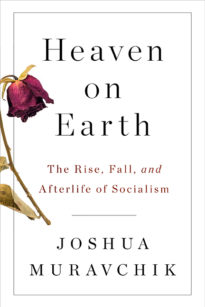First Bernie Sanders and now also Alexandria Ocasio-Cortez, Rashida Tlaib and a bunch of other new office-holders proclaim themselves “democratic socialists.” What is that? I should know. I was on the executive committee of the Socialist Party and I was the leader of its youth wing, the Young People’s Socialist League. The Party was the forerunner of the group Ocasio-Cortez and Tlaib belong to today, and the YPSL was the organization Bernie Sanders joined as a college student.
Back then, we called ourselves “democratic socialists” to emphasize our difference from Communism and miscellaneous other dictatorial regimes in the Third World that proclaimed themselves “socialist.” We were not more moderate in terms of our opposition to capitalism. We sought, as our charter stated, “social ownership and democratic control of the means of production and distribution.” But we insisted on getting there by persuasion, elections, and legislation, not violence and tyranny.
Today’s 'democratic socialists,' in other words, care more for socialism than democracy.
In this we were not unlike numerous parties in Western Europe, Australia, Israel and a few other places, variously named “socialist,” “social democratic,” or “labor,” who together made up the Socialist International. What was different, however, was that unlike our party, which was always marginal, those parties won lots of votes and had the experience of forming governments.
Once elected, they each embarked on a step-by-step march to socialism, and one after another they made the same discovery. They could expand social insurance or other benefits but when they started to nationalize industries or make it too difficult to do business, their economies began to sink. Then they either reversed course or were voted out. Private enterprise, they learned, remained the core of a prosperous economy, the goose that lays the golden eggs, and they ceased trying to kill it. As the British Labour Party, whose charter had once propounded a complete end to capitalism, crooned in the 1990s, Labour is the “party of business.”
They could expand social insurance or other benefits but when they started to nationalize industries or make it too difficult to do business, their economies began to sink.
In short, “democratic socialism” turned out to be a chimera. We democratic socialists clung to the hope that this would change someday. But meanwhile what was a democratic socialist to do? In the here and now there were countries that were democratic but not socialist and other countries that were socialist but not democratic. Sometimes one had to chose between them. Which to prefer?
For me and most of my Socialist comrades back then, democracy was all-important. We supported the capitalist West against the Communist bloc, for which we were sometimes derided as “Cold War socialists” and why Bernie Sanders left our group for more radical ones.
Sanders and his fellow self-styled “democratic socialists” of today seem to make the opposite choice. As mayor, Sanders made Burlington, Vermont a “sister city” to Yaroslavl in the USSR. He went there on his honeymoon and returned to say of the Soviet Union:
[We were] extremely impressed by their public transportation system. The stations themselves were absolutely beautiful. . . . Also I was impressed by the youth programs they have,. . . and cultural programs that go far beyond what we do in this country.
In 1985, he traveled to Nicaragua to celebrate the sixth anniversary of the seizure of power by the Sandinista Liberation Front. “Nobody denies,” he declared, “that they are making significant progress” giving power to “the poor people, the working people.” How did he know? The rulers told him so. In 2016, now a national figure, Sanders spoke more guardedly, pronouncing a mixed verdict on Fidel Castro but volunteering that “American interference” might be accountable for Cuba’s “negative” features.
Read the full article at USA Today.

